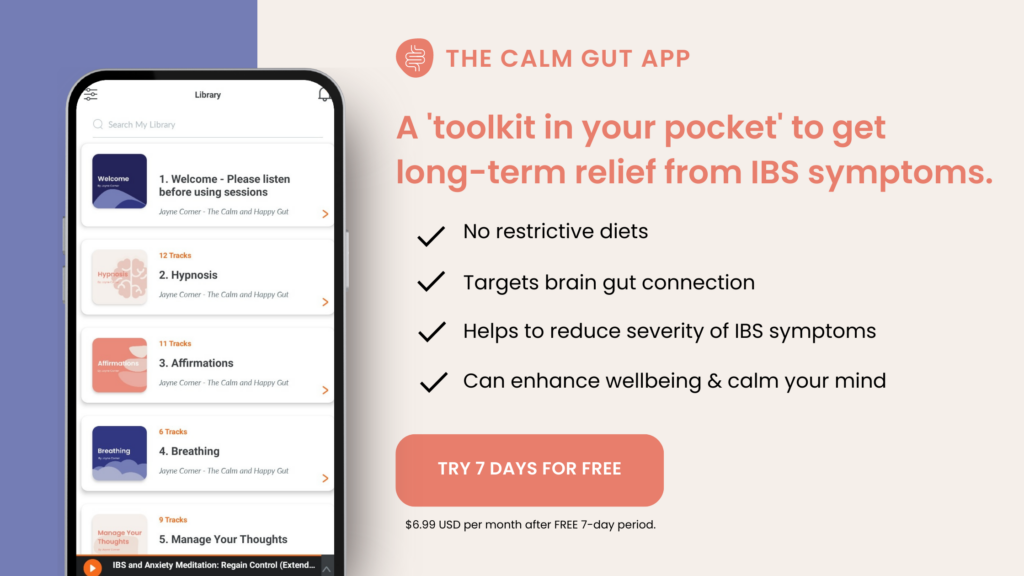Irritable Bowel Syndrome (IBS) is a common, long-term condition that can cause a range of symptoms. These symptoms include stomach pain, bloating, diarrhoea and constipation. Unfortunately, IBS can have a big impact on your life, making everyday activities difficult to do. It can also affect your work, social life and relationships. Although there is no cure for IBS, cognitive behavioural therapy (CBT) has been shown to be an effective treatment.
What is Cognitive Behavioural Therapy (CBT)?
CBT, or cognitive behavioural therapy, is a type of psychotherapy that aims to help people change the way they think and behave. CBT is based on the idea that our thoughts, feelings, and behaviours are all interconnected, and that by changing our thoughts, we can change our behaviour.
During CBT sessions, we’ll work together to identify the negative thought patterns and behaviours that are keeping you stuck. By helping you to challenge these distorted thoughts, you can then learn to see yourself and your situation in a more realistic light and develop new ways of thinking and behaving. In addition, CBT can also teach you healthy coping skills for dealing with stress and difficult life events. Ultimately, CBT is about helping you to feel better by changing the way they think and behave.
Over the years CBT has become one of the most popular types of therapy. This is likely because it’s generally short-term, goal-oriented, hands-on and has been proven to work. It is also a collaborative process, and clients are typically actively involved in the therapy.
How does Cognitive Behavioural Therapy (CBT) help with IBS?
Although there is no cure for IBS, a range of treatments are available to help manage symptoms. One such management approach is cognitive behavioural therapy (CBT). CBT is used to help manage IBS symptoms because of the way your thoughts, feelings, behaviours and IBS symptoms are all connected.
For example, unhelpful or distressing thoughts can negatively impact how you feel. These negative feelings can then impact how you behave and can also trigger gut symptoms. This is because of the very close link between your gut and your brain.
In addition, depending on how you think and feel about your IBS and your diagnosis, you may start to pay greater attention to what’s going on inside of your body. This can lead you to feel more anxious, which actually increases your sensitivity to pain. This increase in sensitivity can then make you feel even more worried and anxious. And so, the cycle of anxiety and IBS symptoms repeat. (I explain more about this increase in sensitivity in my Free Guide: The Ultimate Guide to IBS Gut Pain which you can download here).
Cognitive behavioural therapy for IBS can therefore really help you to understand this connection. You can then recognise and challenge the unhelpful thoughts and beliefs you have about your symptoms.
I frequently use a simple analogy of a mosquito bite to highlight the impact of your thoughts and where you focus your attention. Imagine that you have just been bitten. Immediately you start to notice the area getting itchy. The more you focus in on the bite and the sensation, the more it itches. And the more it itches, the more you scratch it, and the redder, sorer and itchier it gets.
Unfortunately it’s very easy for unhelpful and negative thoughts to keep you stuck in a ‘stress-symptom cycle’’.
CBT can help you feel comfortable again in certain situations
In addition to helping you to identify, challenge and replace unhelpful thoughts around your IBS symptoms, CBT is also a valuable tool in helping you to create changes in your behaviour. This is because your IBS symptoms and the associated anxiety connected with those symptoms can change the way you respond to certain situations.
For example, you may now feel afraid of going to the bathroom in public or eating out at a restaurant. While these actions might feel as though they are helping in the short term, they are in fact increasing your anxiety and keeping you stuck. CBT can help you to challenge these fears and help get you back to feeling more comfortable in those situations. Being able to address these changes in behaviour can have a huge impact on your quality of life.
Relaxation and breathing exercises for IBS and anxiety
In addition to challenging unhelpful thoughts, cognitive behavioural therapy can also help you control your anxiety and stress levels. This is especially important when it comes to irritable bowel syndrome. Therefore relaxation, including breathing exercises such as diaphragmatic and box breathing is a key strategy to learn. Breathing exercises which involve focusing on the breath and counting breaths help to calm the mind and body in two main ways:
- They help you become more aware of the physical tension in your body which may be contributing to your IBS symptoms.
- They help stop the harmful effects of the fight or flight response (triggered by stress) by turning on your “rest and digest” response. Unfortunately, when your stress response is triggered, digestion can be significantly affected.
In summary CBT can help you to better control your mind’s response to the sensations of pain and discomfort with IBS, and ultimately help you get back to living and enjoying life again.
How effective is Cognitive Behavioural Therapy for IBS?
When it comes to the actual research, there are many studies demonstrating that cognitive behavioural therapy is a very effective treatment for irritable bowel syndrome (IBS).
In one study, 77% of patients who underwent CBT reported relief in their IBS symptoms, compared to just 21% of patients in the control group. CBT appears to be particularly effective for IBS patients who also suffer from anxiety or depression.
Another study into cognitive behavioural therapy for IBS investigated a combination of progressive muscle relaxation, cognitive behavioral strategies, and problem-solving approaches in comparison to a standardised medical treatment with drugs and regular appointments with a gastroenterologist. The group with the extended psychological treatment showed a decrease of bowel symptoms and an increase of well-being, quality of life and control of disease after 3 and 6 months compared to the control group whose symptoms remained unchanged.
In fact, when it comes to different modalities of psychotherapy in the treatment of IBS, CBT is the most rigorously tested with at least 20 published randomised control trials. These studies consistently demonstrate that CBT can help to reduce symptoms and improve quality of life.
Research also suggests that many IBS sufferers respond to CBT in as little as four sessions, and I frequently see significant client improvement in two sessions when combined with gut directed hypnotherapy.
Gut Hypnotherapy or CBT, which works better for IBS?
Cognitive behavioural therapy and gut directed hypnotherapy are considered the two leading psychological therapies for treating IBS, and have the largest evidence base between them.
Many people find that one or both of these therapies can significantly help them to manage their condition and reduce the symptoms of IBS. This is highlighted by a 2015 study that showed on average, individuals who received psychotherapy had a greater reduction in GI symptoms after treatment than 75% of individuals assigned to a control condition.
These management approaches are also safe and do not involve stressful and confusing diets, or taking medication and having to live with the side-effects. In fact, the American Gastroenterological Association recommends psychological interventions for patients with moderate-to severe IBS or who do not respond to standard medical care, and for whom psychological factors exacerbate their symptoms.
Because of the effectiveness of cognitive behavioural therapy for IBS, I combine CBT with gut directed hypnotherapy inside my IBS hypnotherapy program when I work 1:1 with clients.
What is the difference between Cognitive Behavioural Therapy for IBS and gut hypnotherapy?
The main difference between the two approaches is that cognitive behavioural therapy is designed to build healthy coping strategies and thought patterns, whereas gut directed hypnotherapy targets the nervous system e.g., the oversensitive nerves in the gut, and the miscommunication occurring between the gut and the brain.
Psychoeducation is also a key component of CBT, which involves dispelling myths about IBS, explaining the brain–gut axis, the physiological stress response, and the rationale for using mind-gut therapies. By taking the time to help you really understand what’s happening inside of you body, you understand why standard medical treatments have been ineffective at adequately treating your symptoms and why the approach I take is different.
Does CBT for IBS online work?
A recent study published in the Journal of Clinical Gastroenterology found that CBT online may be an effective treatment for Irritable Bowel Syndrome. In this randomised controlled trial, they found that a primarily home-based version of CBT produced significant and long-term gastrointestinal symptom improvement for patients.
The study involved a group of patients with IBS who were assigned to either CBT or a control group. The CBT group participated in 10 weekly online sessions with a therapist, during which they learned about CBT techniques such as cognitive restructuring and exposure therapy. They were also given homework assignments to practice these techniques between sessions. The control group didn’t receive any CBT, but were instead given general information about IBS.
A follow up to this study in 2019 compared both telephone-delivered CBT and web-based CBT to a control group to treat irritable bowel syndrome. Once again, the participants who received CBT (either by telephone or via the web) showed significant improvements in IBS outcomes, and that these improvements were sustained at 3, 6 and 12 month follow up.
I’m here to help
If you’re tired of struggling with your IBS symptoms alone and you don’t know where to turn next, then my gut directed hypnotherapy program – The Calm Gut Program may just be the answer.
If you’d like to explore whether hypnotherapy and cognitive behavioural therapy for IBS and my Calm Gut Program is the right approach for you, then book a free 30 minute consultation. With almost 40 years of solid evidence behind it, gut directed hypnotherapy and CBT have been shown to reduce IBS symptoms in more than 70-80% of people. In this free 30 minute call, we will discuss:
- Your current IBS symptoms, health history and challenges you’re experiencing
- What you’ve already tried to get relief from IBS and why you’re still stuck
- How hypnosis for IBS (also known as gut directed hypnotherapy) works and determine a program of therapy going forward.
If you have any questions before booking this call, you can contact me here.

